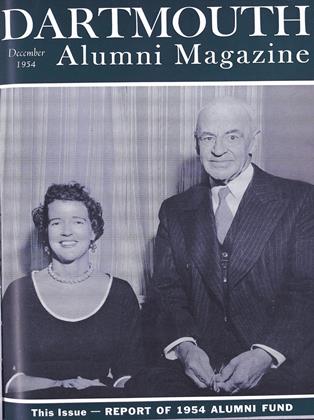THIS month's issue of the ALUMNI MAGAZINE, carrying the full report of the record-breaking 1954 Alumni Fund, gives impressive evidence of the depth and breadth of the support that Dartmouth men are giving to the College. There are many things about Dartmouth that merit and attract such support, and one of the most important, perhaps the most important at the present time, is the College's dedication to intellectual freedom in its day-by-day work.
Two events of the past month have brought this underlying quality to the surface. One involved undergraduates, the other the faculty.
The national collegiate debate topic this year is "Resolved, That the United States Should Extend Diplomatic Recognition to the Communist Government of China." Because present United States policy is firmly in the negative, the debate topic was banned at West Point, Annapolis and the Merchant Marine Academy. When the Naval Academy debaters proposed to Dartmouth's Forensic Union that a dual debate on another topic be arranged, the executive committee of the Union promptly and unanimously rejected the offer, saying in their telegram, .. if we were to accept your proposal for the reason you have given, we Would be giving our tacit approval to the decision that midshipmen should not exercise the same freedom of speech as other citizens. We can neither condone nor support this decision."
The stand taken by Dartmouth's undergraduate debaters provided the lead for groups at other colleges and attracted to the campus the sort of attention that had been aroused before by the students' strong stand against fraternity discrimination. As part of this, the Edward R. Murrow television show See It Now on the night of November 23 included a statement by Thomas L. Waddell '55, president of the Dartmouth Forensic Union, who explained Dartmouth's stand and proposed that Navy debate whether the service academies should be allowed to debate the national topic.
The faculty also had a chance to take a stand on intellectual freedom when it was asked to support a Resolution Upon Freedom of Inquiry adopted by the Williams College faculty in May and since backed by faculty groups at Amherst, Bowdoin and Wesleyan. In the first period of signing, more than one hundred members of the Dartmouth faculty signified their individual concurrence in the Williams declaration "that higher education in this country is now seriously threatened by forces attacking its necessary condition, freedom of inquiry." The Resolution also stated in part:
"Our anxiety is most sharply defined in relation to higher education. Irresponsibly conducted investigations have not only damaged the reputations of individual teachers but also impugned the integrity of the whole profession and made suspect the processes of liberal education itself. ...
"This undermining of confidence in education is perhaps for teachers the most oppressive result of the current crisis, but more overt attacks on freedom of education have also been made. There have been public and private efforts to restrict the selection of textbooks and library volumes, to determine the content and method of courses, and to force administrators, trustees and school boards to discharge non-conformist teachers. Some of these efforts have succeeded. Whenever and wherever such efforts succeed, education has to some degree become indoctrination, and teaching has become the dissemination of propaganda. And even when these efforts fail, the presumption of academic incompetence has contributed once again to the undermining of confidence in education.
"Our educational system is still an exceptionally vigorous and healthy one. But we cannot preserve that vigor by minimizing or disregarding the real and imminent threat to our traditions of free education in the form of corruption by fear. Assaults upon intellectual freedom must be recognized as such and met with immediate and forceful and repeated denunciation. ...
"We recognize fully that our responsibilities are larger than the defense of education. Freedom of inquiry cannot survive in our schools if it is abandoned elsewhere. Only by encouraging such freedom in every area of our society shall we have the creative thought and action which enable a democracy to endure."
 View Full Issue
View Full Issue
More From This Issue
-
 Feature
FeaturePREFACE TO DARTMOUTH
December 1954 By EDWARD CONNERY LATHEM '51 -
 Feature
Feature"The Record of Their Fame"
December 1954 By FORD H. WHELDEN '25 -
 Feature
Feature"They Game from America and They Were Four"
December 1954 By PROF. HENRY B. WILLIAMS, -
 Feature
FeatureA Report on Finances
December 1954 -
 Class Notes
Class Notes1918
December 1954 By ERNEST H. EARLEY, W. CURTIS GLOVER, RICHARD P. WHITE -
 Class Notes
Class Notes1930
December 1954 By ALEX J. MCFARLAND, CHARLES V. RAYMOND, HENRY S. EMBREE,







